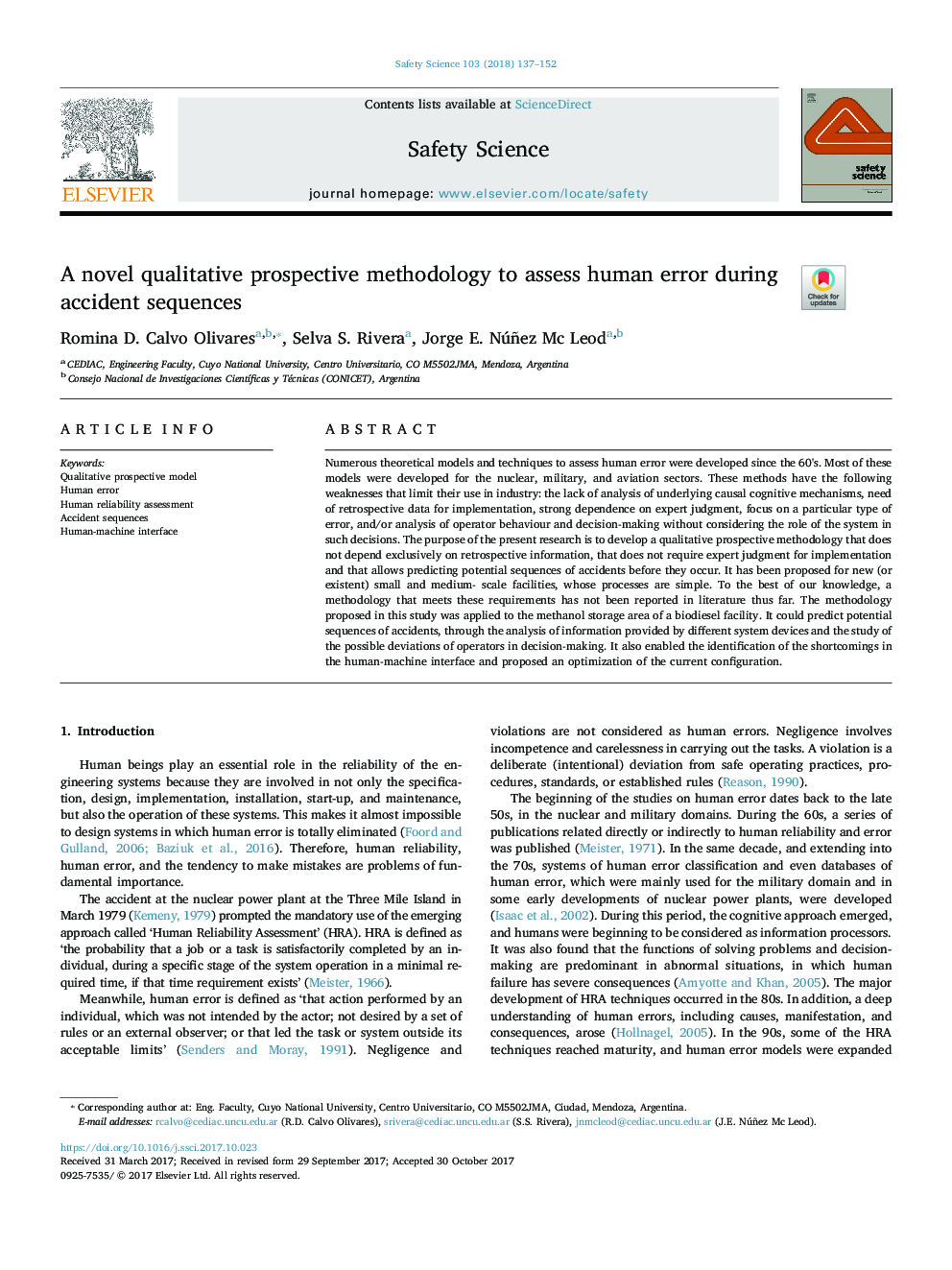| کد مقاله | کد نشریه | سال انتشار | مقاله انگلیسی | نسخه تمام متن |
|---|---|---|---|---|
| 6975083 | 1453369 | 2018 | 16 صفحه PDF | دانلود رایگان |
عنوان انگلیسی مقاله ISI
A novel qualitative prospective methodology to assess human error during accident sequences
ترجمه فارسی عنوان
یک روش جدید پیشگویی کیفی برای ارزیابی خطاهای انسانی در طی مراحل حادثه
دانلود مقاله + سفارش ترجمه
دانلود مقاله ISI انگلیسی
رایگان برای ایرانیان
کلمات کلیدی
مدل آینده نگر کیفیتی، خطای انسانی، ارزیابی قابلیت اطمینان انسان، توالی های حادثه، رابط انسان و ماشین،
ترجمه چکیده
مدل های نظری متعدد و تکنیک های ارزیابی خطاهای انسانی از دهه 60 به وجود آمد. اکثر این مدل ها برای بخش های هسته ای، نظامی و هوایی طراحی شده اند. این روش ها دارای نقاط ضعف زیر است که استفاده آنها را در صنعت محدود می کند: فقدان تجزیه و تحلیل مکانیسم های شناختی علمی، نیاز به داده های گذشته نگر برای پیاده سازی، وابستگی شدید به قضاوت کارشناس، تمرکز بر نوع خاص خطا و / یا تجزیه و تحلیل اپراتور رفتار و تصمیم گیری بدون توجه به نقش سیستم در چنین تصمیماتی. هدف از تحقیق حاضر، توسعه یک روش پیش بینی کیفی است که به طور انحصاری بر اطلاعات گذشته نگر نیست، که نیازی به تصمیم گیری متخصص برای پیاده سازی نیست و اجازه می دهد پیش بینی توالی های احتمالی حوادث قبل از آنها رخ دهد. این پیشنهاد شده است برای امکانات جدید (یا موجود) کوچک و متوسط که فرایندهای آنها ساده است. تا به حال به بهترین دانش ما، روش شناسی که مطابق با این الزامات است، در ادبیات تا کنون گزارش نشده است. روش پیشنهادی در این تحقیق به منطقه ذخیره سازی متانول یک تاسیسات بیودیزل اعمال شد. این می تواند توالی های احتمالی حوادث را از طریق تجزیه و تحلیل اطلاعات ارائه شده توسط دستگاه های مختلف سیستم و بررسی انحرافات احتمالی اپراتورها در تصمیم گیری پیش بینی کند. همچنین شناسایی کاستی ها در رابط کاربری انسان و دستگاه را بهینه سازی پیکربندی فعلی پیشنهاد داد.
موضوعات مرتبط
مهندسی و علوم پایه
مهندسی شیمی
بهداشت و امنیت شیمی
چکیده انگلیسی
Numerous theoretical models and techniques to assess human error were developed since the 60's. Most of these models were developed for the nuclear, military, and aviation sectors. These methods have the following weaknesses that limit their use in industry: the lack of analysis of underlying causal cognitive mechanisms, need of retrospective data for implementation, strong dependence on expert judgment, focus on a particular type of error, and/or analysis of operator behaviour and decision-making without considering the role of the system in such decisions. The purpose of the present research is to develop a qualitative prospective methodology that does not depend exclusively on retrospective information, that does not require expert judgment for implementation and that allows predicting potential sequences of accidents before they occur. It has been proposed for new (or existent) small and medium- scale facilities, whose processes are simple. To the best of our knowledge, a methodology that meets these requirements has not been reported in literature thus far. The methodology proposed in this study was applied to the methanol storage area of a biodiesel facility. It could predict potential sequences of accidents, through the analysis of information provided by different system devices and the study of the possible deviations of operators in decision-making. It also enabled the identification of the shortcomings in the human-machine interface and proposed an optimization of the current configuration.
ناشر
Database: Elsevier - ScienceDirect (ساینس دایرکت)
Journal: Safety Science - Volume 103, March 2018, Pages 137-152
Journal: Safety Science - Volume 103, March 2018, Pages 137-152
نویسندگان
Romina D. Calvo Olivares, Selva S. Rivera, Jorge E. Núñez Mc Leod,
